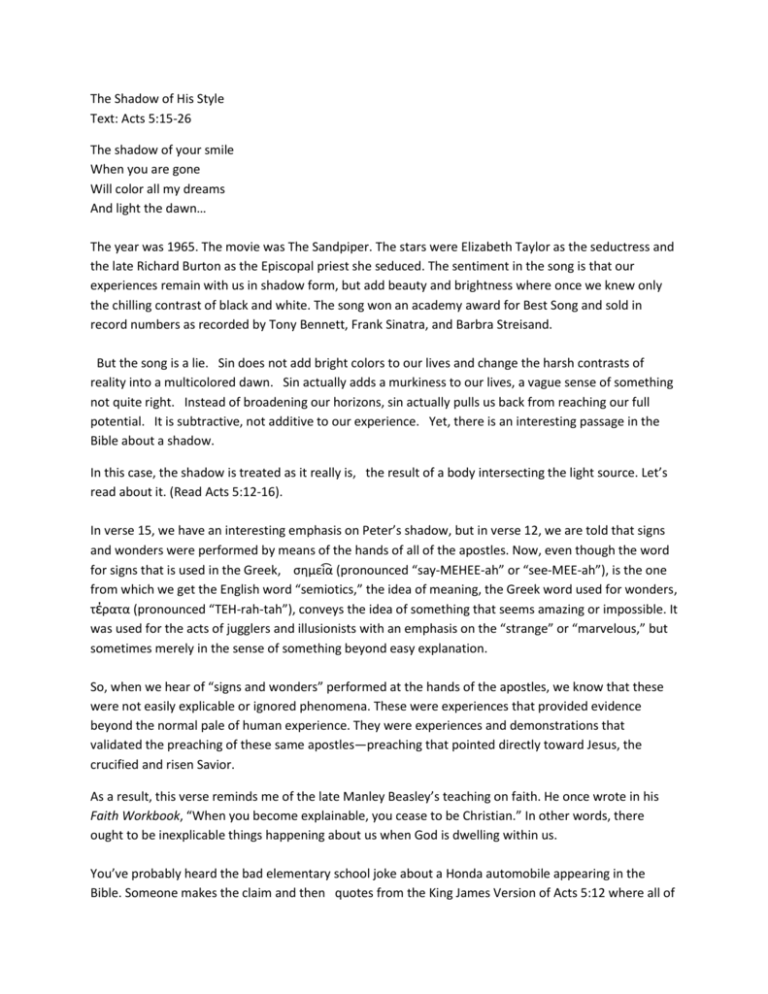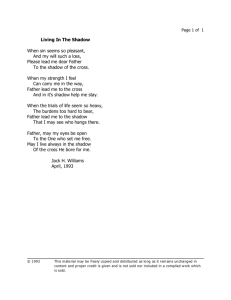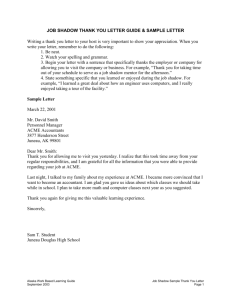9_Shadow of his Style_plain - True North Christian Fellowship
advertisement

The Shadow of His Style Text: Acts 5:15-26 The shadow of your smile When you are gone Will color all my dreams And light the dawn… The year was 1965. The movie was The Sandpiper. The stars were Elizabeth Taylor as the seductress and the late Richard Burton as the Episcopal priest she seduced. The sentiment in the song is that our experiences remain with us in shadow form, but add beauty and brightness where once we knew only the chilling contrast of black and white. The song won an academy award for Best Song and sold in record numbers as recorded by Tony Bennett, Frank Sinatra, and Barbra Streisand. But the song is a lie. Sin does not add bright colors to our lives and change the harsh contrasts of reality into a multicolored dawn. Sin actually adds a murkiness to our lives, a vague sense of something not quite right. Instead of broadening our horizons, sin actually pulls us back from reaching our full potential. It is subtractive, not additive to our experience. Yet, there is an interesting passage in the Bible about a shadow. In this case, the shadow is treated as it really is, the result of a body intersecting the light source. Let’s read about it. (Read Acts 5:12-16). In verse 15, we have an interesting emphasis on Peter’s shadow, but in verse 12, we are told that signs and wonders were performed by means of the hands of all of the apostles. Now, even though the word for signs that is used in the Greek, σημε͡iα (pronounced “say-MEHEE-ah” or “see-MEE-ah”), is the one from which we get the English word “semiotics,” the idea of meaning, the Greek word used for wonders, τέρατα (pronounced “TEH-rah-tah”), conveys the idea of something that seems amazing or impossible. It was used for the acts of jugglers and illusionists with an emphasis on the “strange” or “marvelous,” but sometimes merely in the sense of something beyond easy explanation. So, when we hear of “signs and wonders” performed at the hands of the apostles, we know that these were not easily explicable or ignored phenomena. These were experiences that provided evidence beyond the normal pale of human experience. They were experiences and demonstrations that validated the preaching of these same apostles—preaching that pointed directly toward Jesus, the crucified and risen Savior. As a result, this verse reminds me of the late Manley Beasley’s teaching on faith. He once wrote in his Faith Workbook, “When you become explainable, you cease to be Christian.” In other words, there ought to be inexplicable things happening about us when God is dwelling within us. You’ve probably heard the bad elementary school joke about a Honda automobile appearing in the Bible. Someone makes the claim and then quotes from the King James Version of Acts 5:12 where all of the believers were in one “Accord.” You’d probably understand what the verse really means if I pronounce the Greek word for this (̔̔ομοθυμαδ̀̀̀̀ὸν) as “oh-moh-thee-mah-thohn” you might hear the “homo” prefix that means “the same” and a word that sounds like the English word “theme.” It actually means “desires.” So, they were in “one accord” (KJV), they had the same desires, objectives, and agenda—even as they met regularly at Solomon’s Portico. This word, with its root idea of the same desires, is used 10 times in the Book of Acts. Most of the time it is about God’s people being united in what God wanted them to do, but sometimes, it is about the enemies of God being united in what they wanted to do to God’s people. Regardless, it reminds us of the power of unity. In a very real sense, the church is like a broom. Would you like to sweep the floor with one straw from a broom? Of course not! But when many straws are bound together and attached to a handle, they have the power to move a lot of dirt. Like the straws, we really aren’t very useful to God by ourselves, but when we are bound into unity with God and each other through the power of the Holy Spirit, we become effective as He wields the handle where He wills it. That’s being of ONE ACCORD! But there are some people who just don’t want to be associated a bunch of fanatics or they don’t want to take the risk of being persecuted if things go wrong. Just observe in verse 13 that there were a bunch of folks who seem to be hanging around on the fringes. They don’t want to join—even though they held this group of believers in “high regard” (“esteemed them highly”—KJV, “held them in high honor”— RSV). Peterson’s “The Message” words it well, “But even though people admired them a lot, outsiders were wary about joining them.” Some scholars have tried to transform the vowel in the word for “joining” from a short “o” sound to a long “o” sound. Then, they can say that people were afraid to interrupt the group or afraid to disturb the group. But this verb is the one that was often used in the classical world for piecing tile together in a tight inlaid pattern. I truly believe it was clear that while the general populace approved of what the early church was doing—the healing, the charity, and the like—they didn’t really want to become inlaid in the mosaic that the Holy Spirit was creating. And even today, when the church is what it is supposed to be, people have trouble figuring it out. They approve of our charitable ministries and our disaster efforts, but they don’t want to be locked into a covenant relationship with us. They don’t want to be tied down to Bible-based principles and they don’t want their freedom sacrificed—even when that sacrifice might demonstrate love in its truest sense. They had that back-row mentality, the “I’ll come to see a movie or a concert or put my kids in Bible School, or send them to church camp, but don’t expect me to be involved myself” approach to church. But in spite of all the folks that hung around Solomon’s Portico for curiosity’s sake, to see what was going to happen next, verse 14 tells us that not everyone was afraid to join. Multitudes were becoming involved and one of the classic barriers of all history was tumbling down. Both men AND women were joining the church. Both men AND women were trusting in Jesus. Both men AND women were expecting God to be at work. And so, we come to the shadow passage. We rarely think of shadows in positive terms. My grandparents used to speak of someone “being afraid of his own shadow.” One of my favorite old radio programs was Orson Welles as “The Shadow,” a character who, along with apostle Paul inspired the lyrics of my favorite DEVO song, “The Shadow:” Dr. Jekyll and Mr. Hyde A real nice guy with a na na –n-na nasty side In trouble he tried to hide from himself …. Everybody All of us got a shadow. Who knows what lurks in the hearts of men? The Shadow knows We become what we do not what we pretend Between the intention and the expression Between the emotion and the response Falls the shadow Sometimes I fail to follow through On things that I want to do Other times I find myself doing the very things I hate But in our passage, there are lots of people who want to get in Peter’s shadow. Superstitiously, they believed that just being in his shadow would heal them. And the passage itself doesn’t say that anyone in Peter’s shadow would actually be healed, but since the next verse (16) says that every sick person brought to the apostles was healed and every possessed person brought for deliverance was delivered, it might have occurred so. Even so, I insist that it was not Peter’s shadow that healed them anymore than it was the handkerchiefs in Acts 19:12 that healed. It was the proximity of holy men filled up with the power of God, indwelt with the presence of the Holy Spirit and totally expectant of the Holy Spirit to accomplish impossible deeds for God. By the way, when I lived in Georgia, I got a prayer handkerchief in the mail. It was a fundraising approach by an interdenominational group and it cited Acts 19 as its affirmation. They missed the point! Even as the people snuggling together under Peter’s shadow missed the point. The power—the healing, freeing, life-giving power comes from God—not from physical manifestations. If I’m confessed up, cleansed, forgiven, and fully cooperating with God’s Holy Spirit, my prayer for your healing or deliverance is every bit as powerful whether or not you’ve ever been touched by my shadow or given a piece of cloth that once touched me. The power is God’s. And if I’m not affecting my world and you’re not affecting your world like Peter and Paul did, it isn’t your shadow’s fault. It’s that we aren’t allowing God to flow through us totally and completely—no holds barred—no reservations—no hesitations. Oh, I’m sure there were people who shivered and got goose bumps from proximity to Peter. Part of it might have been real and a lot of it might have been due to self-hypnosis. Frankly, it’s to be expected that people will be amazed, sometimes confused, and sometimes bewildered when God is at work. And if God is really accomplishing the unexpected in us, people will ascribe power to us instead of to God. After all, once the handkerchiefs started going out in Acts 19, the seven sons of Sceva thought they could indulge in second-hand deliverance just like folks were experiencing healing once removed. The demons set them straight in a hurry. Just in case you don’t know that story, let me read this from the paraphrase we know as The Living Bible: “A team of itinerant Jews who were traveling from town to town casting out demons planned to experiment by using the name of the Lord Jesus. The incantation they decided on was this: “I adjure you by Jesus, whom Paul preaches, to come out!” Seven sons of Sceva, a Jewish priest, were doing this. But when they tried it on a man possessed by a demon, the demon replied, “I know Jesus and I know Paul, but who are you?” And he leaped on two of them and beat them up so that they fled out of his house naked and badly injured.” (Acts 19:11-16) I truly believe that we’re better off focusing on the direct ministry of verse 16 than the shadow ministry of verse 15 or the pass-along healing handkerchiefs of Acts 19. If we expect to see lives and circumstances changed around us, it’s going to take direct involvement with the Lord. We have to be closer and more in synch with Him! And, of course, whenever we are in synch with Him and lives begin to be changed, that old spiritual physics lesson about an equal and opposite reaction comes into play. The devil assembles his troops. Let’s listen. (Read Acts 5:17-26) The King James translates the last part of verse 17 as stating that these rulers (high priest and dignitaries) were full of indignation. The word can actually mean “ardor,” “enthusiasm,” “envy,” “jealousy,” or “zeal.” It can be both good or bad energy, depending on the context, and in this context, I think it’s both. If you ever want to see an officeholder—be he or she clergy or politician—catch fire, just threaten his or her sense of authority. The high priest and his elitist party of Sadducees noticed that the crowds in the portico just kept getting bigger. Realizing that their influence was declining, they needed an issue. So, they pretended that their very faith was at risk. They arrested the apostles and locked them up for the night, expecting to bring them out for trial and possible execution for blasphemy on the next morning. Just a word to the wise—watch out for those people who claim to be protecting our freedoms. Those who invoke the words about freedom the most, or peace the most, much like those who invoke words about the Bible (instead of from the Bible) the most, are most likely those who will reduce the respective significance of all three. Adolf Hitler talked a whole lot about peace—even as he was actively working against it through building up munitions and annexing territory by violent and unsavory means. But he could speak passionately about how all Germany needed was Lebensraum and they could guarantee peace. Do you think the high priest and dignitaries were really concerned about what God wanted? I don’t either, but they could sure make convincing speeches about it. They locked away God’s apostles and though their crisis of influence was over. But God had other ideas. God isn’t afraid to get His hands dirty. The angel of the Lord, a phrase that always meant God Himself in the Old Testament, unlocks the prison. God rescues them. We could even say that God “saves” them, especially since we think the lynch mob of priests had an execution in mind (I get that from Gamaliel’s words in the last part of the chapter when he speaks of Theudas’ death and a revolutionary named Judas who died.). But I truly believe it underscores another point. God saves people FOR something. In this case, the angel tells them to go back to the temple, stand up, and speak all of the words of this Life. In the midst of opposition and hostility, they were to speak up and teach the commandments (this Greek word refers to orders and directions more than philosophy or ordinary words) about the LIFE that really matters—eternal life, beginning now and lasting forever. And anytime the church is doing what it is supposed to be doing, it will have representatives in the midst of opposition and hostility, speaking up and teaching God’s directives about real LIFE—what REALLY matters! So, here they are—God’s people preaching, teaching, healing, and delivering people in their usual spot and the authorities send the jailers down to the prison to get them—thinking they are there. It’s almost like a comedy you’d see in the movies. The guards are protesting that the jail doors are locked but the cells are empty; the dignitaries are scratching their heads and trying figure out where the apostles could have gone; and suddenly, an innocent messenger comes into the room. You can almost hear the messenger saying, “I thought we got rid of those guys, but they’re right back where they’ve always been!” Wow! Wouldn’t it be great if that’s what the opposition had to say about us? We thought we’d convinced everyone that church was dead! But there they are, right back where they’ve always been! We thought we’d convinced everyone that the Bible was irrelevant! But there they are—getting people excited about what God said, just like they’ve always been! Oh, if only we could be that faithful! And so, instead of the necktie party (as they used to call it in the west) or more likely the mob ready to stone the apostles as heretics, we find the opposition on the defensive. Instead of roughly handling the apostles, they invite them into the star chamber of the high priest and council. Why? Because they were afraid their own crowd, their own mob, would turn on them. I want to close here, this morning—not because the disciples are totally out of the woods—there’s a lot of important story left. I want to close here because I think we need to digest what we’ve discovered so far. 1. We need to expect the unexpected and the inexplicable where God is concerned. 2. We need to strive for that one desire, one agenda, one purpose of “one accord.” 3. We need to be inlaid tiles/stones in the mosaic of God’s church. We cannot be what God wants us to be while hanging out on the periphery. Commit! 4. When we are truly in unity with God, people will consider even our proximity to have inexplicable power. 5. When God delivers us, He delivers us for a purpose. We need to be sure we are truly sharing all of His guidance about ETERNAL LIFE. Let us pray.






